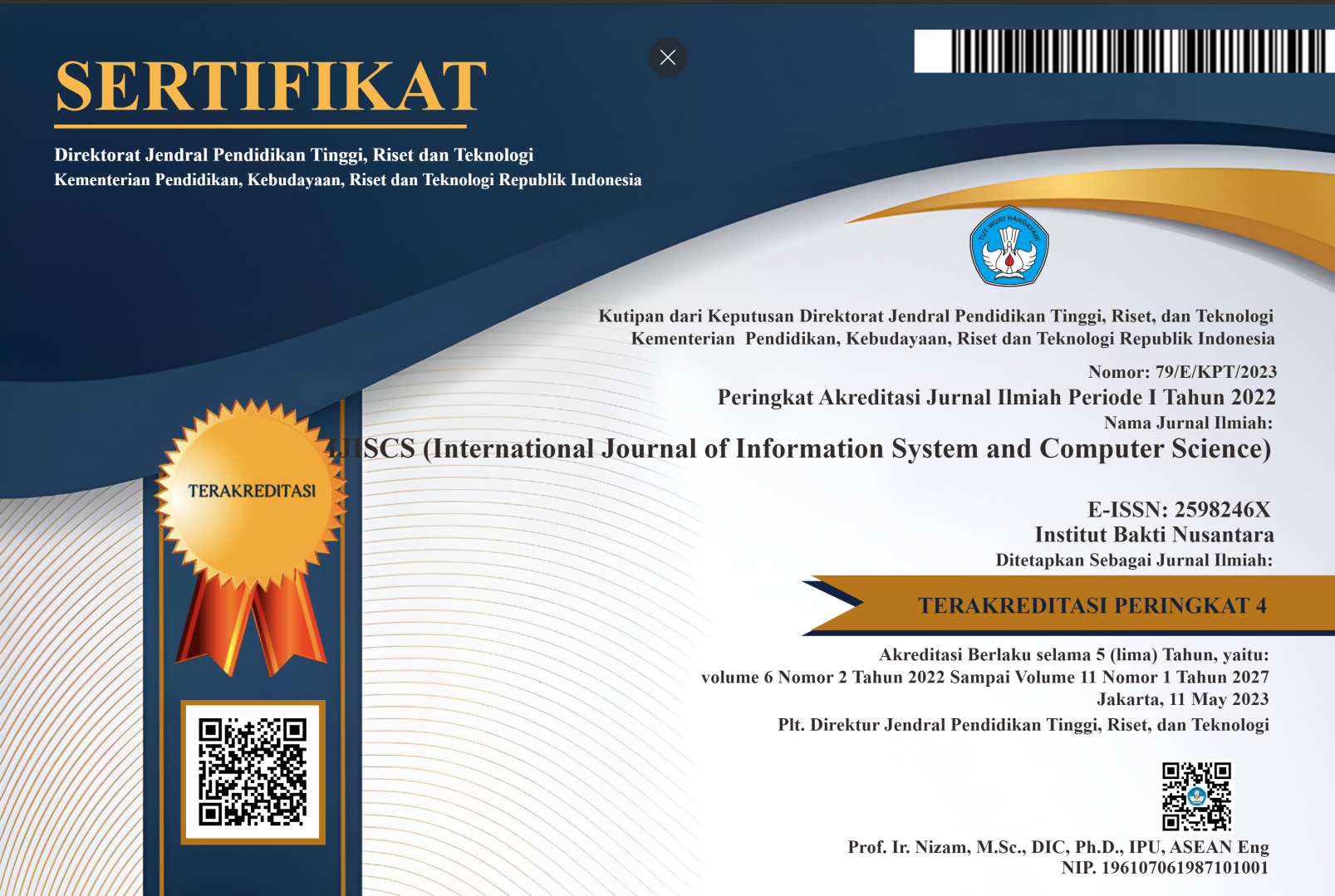DECISION MAKING MODEL FOR MEASURING THE FEASIBILITY OF SOCIAL ASSISTANCE FOR TPS3R AREA OF PRINGSEWU DISTRICT
(1) Information System, IBN Lampung, Lampung
(2) Information System, IBN Lampung, Lampung
(3) Information System, IBN Lampung, Lampung
(4) STIT Tanggamus, Lampung
 Corresponding Author
Corresponding Author
Abstract
Keywords
References
S. A. Utiarahman and H. Dalai, "Application of Analitycal Hierarchy Process Method in Decision Support System for Eligibility of Free Electricity Receiving Households," vol. 9, no. 5, pp. 1659–1668, 2022, doi: 10.30865/jurikom.v9i5.4857.
A. Damuri, U. Riyanto, H. Rusdianto, and M. Aminudin, "Implementation of Data Mining with Naïve Bayes Algorithm for Eligibility Classification of Food Aid Beneficiaries," vol. 8, no. 6, pp. 219–225, 2021, doi: 10.30865/jurikom.v8i6.3655.
I. Seprina, "Decision Support System for Determining Social Assistance Recipients Applying Weighted Product Method (WPM)."
E. R. Susanto, A. S. Puspaningrum, F. Teknik, S. Informasi, and T. Komputer, "Design and Build Recommendations for Social Assistance Recipients Based on People's Welfare Data," vol. 15, no. 1, pp. 1–12, 2019.
A. P. W. Chintya Irwana , Zaki Faizin Harahap, "SPK: ANALYSIS OF MOORA METHOD ON RESIDENTS RECEIVING HOME RENOVATION ASSISTANCE," vol. 10, no. 1, pp. 47–54, 2018.
J. Sains, L. Sopianti, and N. Bahtiar, “Students Major Determination Decision Support Systems using Profile Matching Method with SMS Gateway Implementation Jurnal Sains dan Matematika,” vol. 23, no. 1, pp. 14–24, 2015.
B. E. Turban, J. E. Aronson, and T. Liang, Decision Support System and Intelegent System, 7th Ed. Ji. Yogyakarta: Penerbit Andi Yogyakarta, 2005.
O. Muhamad Muslihudin, Information System Analysis and Design. Yogyakarta: Andi Publisher Yogyakarta, 2016.
Kusrini, Concepts and Applications of Decision Support Systems, 1st Ed. Yogyakarta: Andi Publisher Yogyakarta, 2007.
M. Muslihudin, R. Fitri Andriyanti, S. Mukodimah, P. Sistem Informasi, and S. Pringsewu Lampung, "The Implementation of the Weighted Product Method Determines the Scholarship for Aiming for the Mission of Stmik Pringsewu," Jatisi, vol. 4, no. 2, 2018.
M. F. Prabayu, H. Sibyan, and N. Hasanah, "PIP SOCIAL ASSISTANCE BENEFICIARIES USE," vol. 2, no. 1, pp. 45–49, 2023.
L. G. Rady Putra and A. Anggrawan, "Grouping of Community Social Assistance Recipients with the K-Means Method," MATRIK J. Management, Tech. Inform. and Computate Engineering., Vol. 21, No. 1, pp. 205–214, 2021, DOI: 10.30812/matrix.v21i1.1554.
N. Alfiah, "Classification of Family Hope Program Social Assistance Recipients Using Naive Bayes Method," Respati, vol. 16, no. 1, p. 32, 2021, doi: 10.35842/jtir.v16i1.386.
J. A. S. Siregar and K. Handoko, "ELIGIBILITY ANALYSIS OF COVID-19 BENEFICIARIES USING THE K–MEANS METHOD IN SAGULUNG SUB-DISTRICT BATAM CITY," J. Comasie, vol. 6, no. 2, pp. 40–51, 2021, [Online]. Available: http://ejournal.upbatam.ac.id/index.php/comasiejournal%0AJurnal Comasie ISSN (Online) 2715-6265%0ADESIGN.
W. Lidysari, H. S. Tambunan, and H. Qurniawan, "Application of Data Mining in Determining Eligibility of Recipients of Social Assistance of Pemko with Algorithm C4.5 (Case of Martoba Village Office)," Kesatria J. Application of Sist. Inf. (Computer and Management), vol. 3, no. 1, pp. 53–61, 2022, doi: 10.30645/kesatria.v3i1.97.
Sudaryono, Research Methodology, ed. 1.-Ce. Jakarta: Kharisma Putra Utama Offset, 2017.
Sudaryono, Research Methodology in the Field of TL ( Practical Guide, Theory and Case Examples). Yogyakarta: Andi Publisher Yogyakarta, 2015.
S. Kusumadewi, S. Hartati, A. Harjoko, and R. Wardoyo, Fuzzy Multi-Attribute Decision Making (Fuzzy MADM), Pert Edition. Yogyakarta: Graha Ilmu Publishers, 2013.
Article Metrics
Abstract View : 445 times
: 445 times Download : 163 times
Download : 163 times
DOI: 10.56327/ijiscs.v7i1.1544
Refbacks
- There are currently no refbacks.






